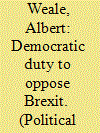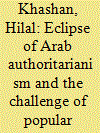| Srl | Item |
| 1 |
ID:
153288


|
|
|
|
|
| Summary/Abstract |
What should be the position of democrats in response to the Brexit referendum? Many urge a duty to accept the result. This article argues the contrary. If someone is a UK citizen, has a belief that leaving the European Union will be damaging to the common good of the UK and is a convinced democrat, then that person has a duty to oppose Brexit. Neither of the two principal reasons for accepting the result—a claim of popular sovereignty or of parliamentary sovereignty—imply a duty not to continue to oppose. Arguments from political equality for simple majority rule do not apply when the alternatives are ill defined. More generally, popular sovereignty presupposes and does not replace constitutional democracy, and in a parliamentary democracy there is always a continuing right to oppose.
|
|
|
|
|
|
|
|
|
|
|
|
|
|
|
|
| 2 |
ID:
113362


|
|
|
|
|
| Publication |
2012.
|
| Summary/Abstract |
This paper proposes that the tumultuous events associated with the Arab uprisings are unlikely to engender democracy in the foreseeable future. At best, they will probably produce unstable political orders on the basis of accommodation and ad hoc political alliances. The argument of this paper lends itself to analysis through the examination of Arabs' experience with (1) failed reforms, (2) regime defiance, (3) the gap between youth awakening and sociopolitical reality and (4) the uneasy encounter between nascent competence, confidence and political consensus. The author's assessment suggests that recent dramatic developments in the Arab region are only the beginning of a long process of political evolution that is unlikely to be concluded before the successful resolution of the issue of political identity and the transformation of Arab publics from subjects into citizens.
|
|
|
|
|
|
|
|
|
|
|
|
|
|
|
|
| 3 |
ID:
162584


|
|
|
|
|
| Summary/Abstract |
Bruce Ackerman argues that the United Kingdom is in such a profound political crisis that it needs a constitutional convention to determine the framework for its political future, especially with respect to its nations. He suggests that the proposals emerging from such a convention assembly be put to a referendum after a country‐wide process of deliberation.
|
|
|
|
|
|
|
|
|
|
|
|
|
|
|
|
| 4 |
ID:
178862


|
|
|
|
|
| Summary/Abstract |
Indian leaders and women’s organisations wanted to ensure that women would participate in and be elected to the legislatures in India’s first elections. Ultimately, however, only a small number of women were selected as candidates, and even fewer were elected to the legislatures. This article explores some of the mechanisms and ways in which this gap emerged in relation to the registration, representation and participation of women in the run-up to and during India’s first elections. In pursuing these three lines of inquiry, the article aims to shed light on the ways in which women related to and appropriated the notion of popular authorisation of the government, and what was their role, in this regard, in democratic state-building during the early days of the republic.
|
|
|
|
|
|
|
|
|
|
|
|
|
|
|
|